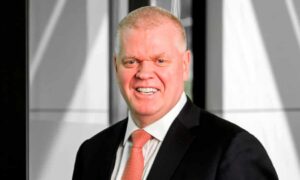
HSBC’s chief executive, Noel Quinn, is seen by many as ending his five-year tenure on a high note. The 62-year-old stunned the banking world this week by saying he planned to retire after an “intense” five years in the role to get a better work-life balance.
Quinn has slimmed down a sprawling global bank, paid out $19bn (£15bn) to shareholders last year and successfully staved off calls to break up the lender.
But Quinn’s fans were clearly not in attendance at HSBC’s annual meeting in London on Friday, where angry pensioners heckled bosses for clawing back their retirement payments and campaigners pushed bosses on climate commitments.
On the sidelines, shareholders such as Geoff Gaskin said that Quinn had “done well as far as the dividend is concerned”, while another conceded that HSBC “couldn’t make money by acting on principles alone”.
Their hopes for Quinn’s successor? Perhaps a more dynamic leader to take his place. “He’s no Jamie Dimon,” another shareholder of 20 years, John Threlfall, said of Birmingham-born Quinn.
But HSBC is no JP Morgan. And if there is one thing that bankers and investors can agree on, it is that helming a bank such as HSBC is not for the faint of heart.
Headquartered in London, but making the bulk of its profits in China, the 159-year-old bank has always had to tread a fine political line between east and west. That tightrope walk will get exponentially harder if Donald Trump returns to the White House and imposes new sanctions on China.
It will need to be someone who possesses “a really, deep emotional intelligence … someone who understands the reality of managing geopolitical risks, while still coming back to its core: someone who understands how a bank works,” one former adviser to HSBC bosses said.
They will also have to be a seasoned crisis manager such as Quinn, who launched his career at the UK’s Midland Bank, before its takeover by HSBC in 1992. “Starting off your career at a tough time means that when you get into a cycle of complexity in business … those formative experiences help you have discipline and an understanding of how things work,” they said.
It helped Quinn win over a tough chairman, his board, as well as the respect of staff. Having worked as a commercial banker, colleagues say he truly understood relationship banking and cross-border finance, key functions for a bank such as HSBC.
In August 2019, after more than three decades at the bank, the father of three was thrown into the chief executive role, initially on an interim basis, after the surprise departure of John Flint. His predecessor resigned just 18 months into the job amid tense disagreements with chairman Mark Tucker.
It put Quinn in a challenging position: parachuted in to lead one of the world’s largest lenders under a chairman whose tough and domineering reputation preceded him, while knowing he was not Tucker’s first choice for the permanent job. One banker, for example, recounts a story of colleagues entering a meeting room to find Tucker – a former trainee professional footballer – holding someone in what appeared to be a friendly headlock. Chief financial officer Ewan Stevenson also quit in 2022, when it was made clear that Tucker did not see him taking the top job anytime soon.
